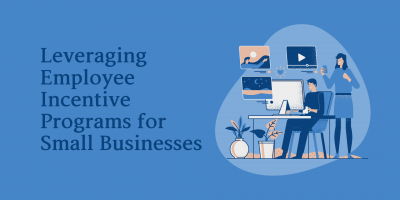
Leveraging Employee Incentive Programs for Small Businesses
Can small businesses truly compete with corporate giants by leveraging employee incentive programs, and what unique strategies can they employ to motivate and retain top talent?

Managing human resources and compliance in-house can often feel like an uphill battle in today’s fiercely competitive business world, where every decision matters.
Whether it’s running a small startup or managing a growing mid-sized company, the demands associated with these responsibilities can quickly become overwhelming. As a result, leaders have increasingly limited time and energy to devote to what truly matters: fostering the growth and prosperity of their businesses.
For these reasons, the role of a professional employer organization, or PEO, is becoming increasingly invaluable. A PEO can step in and take on some of these weighty responsibilities, giving leaders space to focus on more strategic tasks.
In this article, we look ahead to the promising future of PEOs, uncover industry trends, and examine the numerous PEO benefits they offer businesses, solidifying their role as strategic allies.
The term PEO, meaning Professional Employer Organization, refers to a business entity that provides comprehensive HR and employment-related services to other companies.
The primary goal of partnering with a PEO is typically to help businesses streamline their HR responsibilities, save time and money, and mitigate the risks associated with compliance and employee-related issues
A PEO works by establishing a co-employment partnership with a client company.
In this arrangement, the client firm retains day-to-day management control over its employees, while the PEO assumes the formal role of the employer of record for tax and legal purposes.
While the company retains complete control over hiring and firing employees, the PEO often leverages its “employer” status to help secure competitive employee benefits packages.
When a business decides to collaborate with a PEO, the PEO takes on various HR-related responsibilities that the company would typically manage internally, like:
Moreover, the PEO assumes accountability for legal and compliance issues, such as ensuring that the business adheres to OSHA regulations and other federal and state labor regulations.
Additionally, some PEOs offer supplementary services like conducting employee background checks, implementing drug testing programs, and more.
For the PEO to effectively carry out its responsibilities, the client company typically grants the PEO access to its payroll and HR-related data. In some instances, the client company may also delegate certain rights to the PEO, such as the authority to hire, terminate, or discipline employees.
To truly grasp the benefits of a PEO, it’s essential to consider the broader landscape.
Rising insurance premiums have been a persistent trend, adding strain to businesses and employees alike, especially as inflation continues to drive up the cost of living.
In 2022, health benefit costs per employee increased by an average of 3.2%. Yet, forecasts predict an even higher average rise of 5.4% for 2023.
Moreover, the Affordable Care Act (ACA), which became fully effective nine years ago, mandates employers with over 50 employees to provide health insurance or face tax penalties, amplifying the burden on small and medium-sized businesses.
Professional employer organizations (PEOs) offer a solution to this problem.
The PEO advantages can be broadly categorized into three key areas.
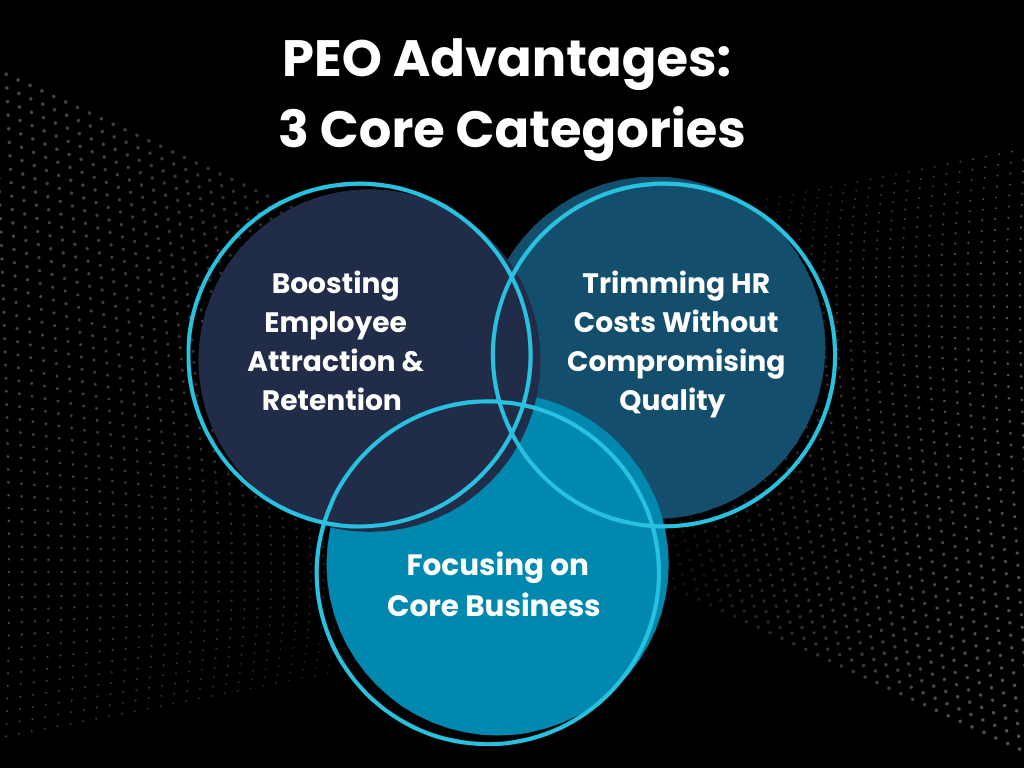
PEOs pool multiple business employees together, giving them the leverage to negotiate better rates with insurance companies and other vendors. Hence, PEO clients can offer their employees the same benefits as larger companies without the high costs.
Some of the most commonly added benefits by new PEO clients include life insurance, retirement plans, and health benefits. It goes without saying that these are all essential offerings that help employees feel secure and financially stable.
The result?
Happier employees who stay committed to the company.
Data shows that PEO clients consistently report high employee satisfaction levels and impressively low turnover rates. When stacked against national averages, PEO clients come out ahead with nearly 20% lower turnover rates.
Perhaps the most significant value lies in the peace of mind they provide for business leaders.
By entrusting specialized entities to manage evolving employment laws and HR complexities, leaders can redirect their focus toward core business functions, strategy, and growth.
Recent research by economists Laurie Bassi and Dan McMurrer reveals compelling PEO statistics: businesses utilizing PEOs experience 7 to 9 percent faster growth, a 10 to 14 percent decrease in employee turnover, and are 50 percent less likely to go out of business.
PEO clients reap a staggering annual return on investment (ROI) of approximately 27.2%, achieved through cost savings across five key HR-related areas: HR personnel, health benefits, workers’ compensation, unemployment insurance (UI), and external HR-related expenses, like payroll and benefits administration.
Note that this impressive ROI calculation only covers cost savings – it doesn’t even account for the fantastic benefits mentioned above.
Furthermore, PEOs possess the expertise to stay current with evolving regulations, helping businesses avoid costly compliance errors.
While PEOs can be valuable for many companies and organizations, the PEO benefits for small businesses can be even more tremendous.
In fact, nearly two-thirds of all PEO clients fall within the 10 to 49-employee range.
Why is this such a game-changer for small businesses?
The answer lies in the inherent challenges of running a small operation with limited staff and resources.
When a small business teams up with a PEO, it opens up a world of opportunity to shift focus towards company growth and development.
In essence, partnering with a PEO mirrors having a dedicated HR team minus the overhead and in-house management complexities.
The numbers back this up, with a resounding 98% of PEO clients enthusiastically recommending this partnership to small business owners.
Like any business resource, PEOs have their share of disadvantages to consider:
The IRS Voluntary Certification Program for PEOs can help mitigate some of the risks associated with using a PEO, such as the risk of the PEO failing to fulfill tax obligations on behalf of the company.
However, if a company hires an IRS-certified PEO, it will not be held responsible for the PEO’s failure to fulfill its tax obligations.
The professional employer organization industry has experienced significant growth in recent years, driven by a multitude of factors and evolving trends within the business landscape.
Statistics paint a compelling picture of the industry’s expansion: the number of employers embracing PEOs has grown by approximately 40% since 2008, indicating a steady upward trajectory in adoption.
According to the National Association of Professional Employer Organizations (NAPEO), the PEO market is expected to reach $158.99 billion by 2031.
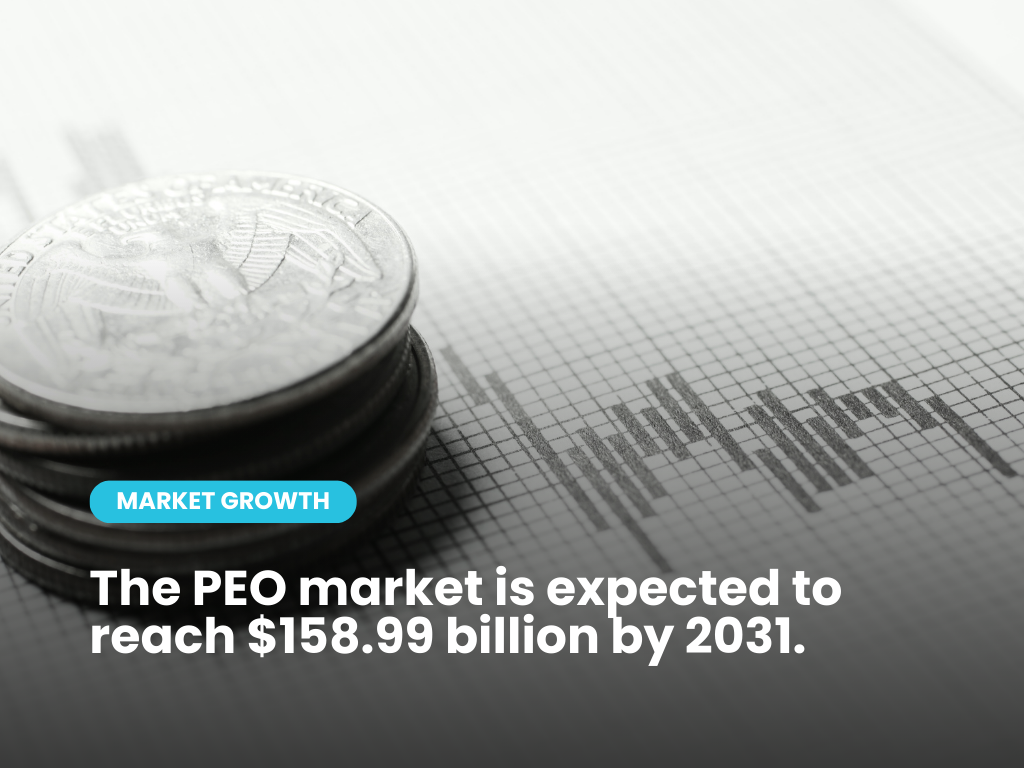
One of the key drivers of the PEO industry’s growth is the increasing awareness of PEOs among business owners and decision-makers.
In 2018, NAPEO found that only 44% of businesses were aware of PEOs. However, by 2022, this number had increased to 65%.
Globalization has also played a pivotal role in the growth of the PEO industry.
With businesses expanding their operations across borders, the complexities of international HR management have multiplied.
PEOs have seized this opportunity by extending their services to encompass global HR solutions. They help companies navigate the intricacies of international employment, from compliance with foreign labor laws to managing payroll in different currencies.
Moreover, the demand for specialized HR services has surged.
As businesses expand and diversify, they require tailored HR solutions that go beyond standard payroll and benefits administration.
PEOs have responded to this need by offering various HR services, including talent acquisition, employee training, and performance management.
As more businesses seek to establish a global presence, PEOs have become indispensable allies.
The PEO industry is undergoing significant transformations in 2023, driven by technological advancements, changing work dynamics, and a growing emphasis on employee well-being.
So, what are some of the most essential PEO industry trends we expect to see in the coming year?
PEOs are at the forefront of a transformative shift in HR management. PEOs are streamlining tasks such as payroll processing, benefits administration, and compliance management by harnessing the power of advanced software, AI-driven tools, and cloud-based platforms.
In addition to streamlining HR processes, PEOs also use technology to enrich the employee experience.
For example, PEOs can provide a digital enrollment process, giving employees access to personalized benefits information and decision-support tools. This can help employees make better choices about their benefits, leading to improved financial security and well-being.
A recent study found that employers partnered with PEOs are 70% more likely to emphasize the importance of improving benefits decision-making for their workers. The study also found that 72% of PEO-affiliated businesses recognize the value of integrating decision support tools into their HR and benefits administration technology.
These findings suggest that PEOs are playing a leading role in the adoption of technology-enabled HR solutions.
In the past, employee benefits packages were often one-size-fits-all, but as businesses have become more diverse, so too have their workforces. This has led to a growing demand for customized benefits packages that meet the unique needs of different employees.
PEOs are well-positioned to deliver customized benefits packages, as they have access to a wide range of benefits providers with better rates.
One trend that is emerging among employers who partner with PEOs is a focus on mental health.
Most of these employers (nearly three-quarters) prioritize fostering a culture of well-being within their organizations. They understand the importance of supporting employees’ mental health and cultivating a caring work environment.
This commitment to integrating wellness programs into employee benefits is reflected in the benefits packages that PEOs offer.
Many PEOs include a variety of mental health resources, such as behavioral health programs, employee assistance programs (EAPs), and employee support groups. These resources are often available at no cost to employees, which can help to reduce the stigma associated with mental health problems.
The results of this focus on mental health are clear.
Employers who partner with PEOs rate their workforce’s overall mental health as “very good” or “excellent” at a significantly higher rate (75%) than those who do not partner with a PEO (60%).
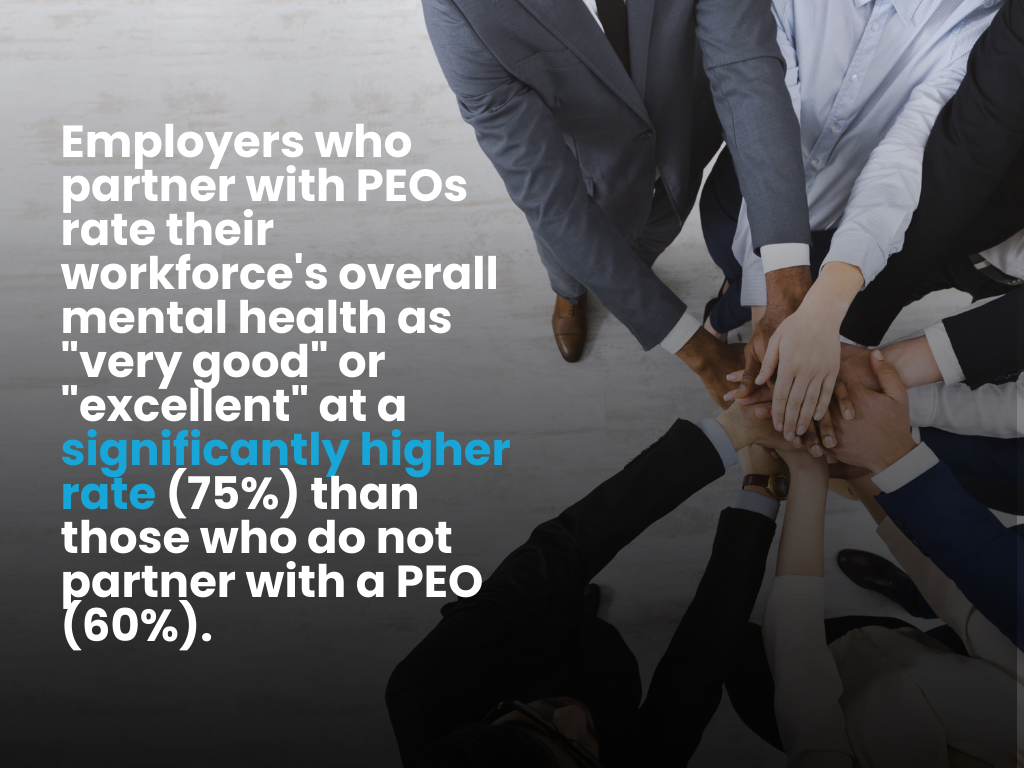
PEOs continue to play a pivotal role in offering invaluable compliance and regulatory expertise to businesses.
The complexity of keeping up with ever-evolving state and federal regulations is a costly challenge for businesses. For instance, companies with fewer than 20 employees spend significantly more per employee on compliance with federal regulations than larger firms.
PEOs alleviate this burden by offering services tailored to specific needs and industries. These services include:
The COVID-19 pandemic has accelerated this trend, expanding the geographic footprint of many PEOs as companies hire remote employees in multiple states.
With the widespread adoption of remote and hybrid work models, PEOs are assisting businesses in navigating the associated challenges.
In most cases, this includes managing virtual teams, addressing productivity and engagement concerns, and implementing tools and strategies for effective remote work.
According to a McKinsey report, businesses expanding into multiple states are more likely to turn to PEOs for their HR needs, illustrating the industry’s adaptability to changing work dynamics.
PEOs are collaborating closely with businesses to foster more inclusive environments. They provide guidance on creating diverse teams and implementing equitable HR practices.
Employers utilizing PEOs are often highly committed to establishing inclusive, community-oriented workplace cultures.
Statistics reveal that companies partnering with PEOs are more likely to offer support and accommodations for employees with physical disabilities and encourage engagement in social responsibility initiatives.
Furthermore, PEOs play a significant role in ensuring DEI compliance with Equal Employment Opportunity (EEO) laws, addressing equal pay and EEO-1 reporting issues.
Additionally, PEOs facilitate the provision of inclusive employee benefits, such as affordable access to 401(k) retirement plans, contributing to narrowing the racial gap in retirement savings.
In a time when diversity and inclusion are paramount, PEOs play a vital role in helping companies navigate these complex issues.
PEOs increasingly leverage data analytics to empower businesses with actionable insights that fuel growth and enhance HR outcomes.
For instance, they can identify anomalies, such as higher turnover rates for specific positions compared to industry benchmarks. Through data analysis, PEOs can pinpoint underlying causes like low wages and excessive overtime, contributing to employee turnover.
With this knowledge, companies can recalibrate their operational practices to boost employee retention and reduce turnover, thereby fostering a more productive and sustainable workforce.
This data-driven approach enables PEOs to offer invaluable support in decision-making, HR optimization, and overall business expansion.
In conclusion, the landscape of Professional Employer Organizations (PEOs) is evolving rapidly, driven by changing regulations, shifting economic dynamics, and technological advancements.
PEO benefits extend far beyond mere assistance in HR tasks.
They empower organizations to navigate the complexities of HR management efficiently, foster employee well-being, and drive sustainable growth.
As we look to the future, it’s clear that the role of PEOs will continue to evolve, making them essential partners for businesses aiming to thrive in the dynamic world of work.
Senior Content Writer at Shortlister
Browse our curated list of vendors to find the best solution for your needs.
Subscribe to our newsletter for the latest trends, expert tips, and workplace insights!

Can small businesses truly compete with corporate giants by leveraging employee incentive programs, and what unique strategies can they employ to motivate and retain top talent?
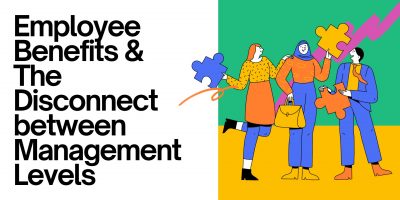
Making a measurable difference through benefit offerings requires fundamental changes in corporate policy and commitment across all leadership levels.

Discover how small businesses and start-ups can benefit from free HRIS software in meeting core HR needs while also increasing the productivity of both managers and employees.
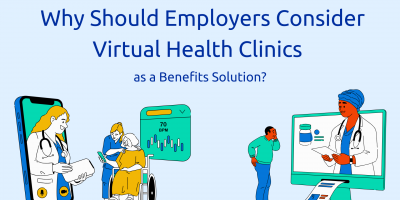
As healthcare continues to shift into the digital realm, employers must reevaluate their benefits packages to meet the growing demand for accessible care. Can virtual health clinics offer a solution to this challenge?
Used by most of the top employee benefits consultants in the US, Shortlister is where you can find, research and select HR and benefits vendors for your clients.
Shortlister helps you reach your ideal prospects. Claim your free account to control your message and receive employer, consultant and health plan leads.